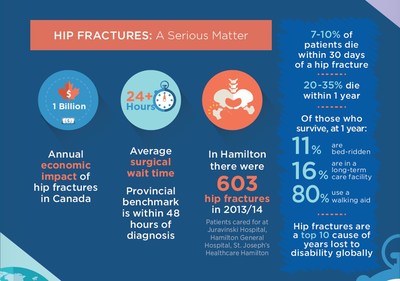|
09.02.2020 22:31:00
|
Real world evidence shows accelerated surgery in patients with hip fracture has substantial benefits
HAMILTON, ON, Feb. 9, 2020 /CNW/ - Canadian researchers have discovered that accelerated time to surgery – within an average of 6 hours after a hip fracture diagnosis – resulted in a lower risk of delirium and urinary tract infections, moderate to severe pain, faster mobilization, and a shorter length of hospital stay compared to standard care – when surgery occurred an average of 24 hours after a hip fracture diagnosis.

The HIP Fracture Accelerated Surgical TreaTment And Care tracK (HIP ATTACK) Trial, presented on Sunday at the Orthopaedic Research Society (ORS) 2020 Annual Meeting and published in The Lancet, was led by researchers of the Population Health Research Institute (PHRI) of McMaster University and Hamilton Health Sciences (HHS) in Hamilton, Canada. HIP ATTACK involved 2,970 people at 69 sites in 17 countries.
Ten years ago, Dr. Devereaux - principal investigator of the HIP ATTACK trial, as well as senior scientific lead of PHRI's perioperative and surgery program, professor of medicine at McMaster, and cardiologist with HHS - was consulted to manage a 73-year-old female with a hip fracture who also had an elevated blood test (troponin) demonstrating heart injury. The referring doctor told Dr. Devereaux the patient's heart issue had to be treated before surgery for her hip fracture could occur. Despite the best of intentions, with the medical treatment Dr. Devereaux provided based on current practice at that time, the patient died before she was able to undergo surgery for her hip fracture.
Upon reflecting on this case, Dr. Devereaux wondered if the prevailing dogma regarding the need to medically optimize patients before hip fracture surgery was the wrong approach. He contacted Dr. Mohit Bhandari, co-principal investigator of HIP ATTACK and an orthopedic surgeon in Hamilton, to get his perspective on the case. Dr. Bhandari told Dr. Devereaux that observational studies suggested that shorter time to surgery may prevent death and major complications in patients with a hip fracture. Based on this evidence, they initiated a large randomized controlled trial to understand the effects of accelerated surgery in patients with a hip fracture.
Accelerated surgery did not result in a reduction in death or a collection of major complications; however, patients randomized to accelerated surgery had a lower risk of delirium, urinary tract infection, moderate to severe pain, and were faster to stand, mobilize, and go home compared to patients randomized to standard care. Among patients who had an elevated blood test (troponin) demonstrating heart injury when they presented to the hospital with their hip fracture, accelerated surgery lowered the risk of death compared to standard care.
- "Hip fracture—as distinct from hip replacement for arthritis—is a medical emergency that kills many older people who would otherwise enjoy many more productive years of life. This study represents a decade of high-quality medical research and very committed patient partners to answer a very important practical question," said Karim Khan, Scientific Director of Canadian Institutes of Health Research Institute (CIHR) of Musculoskeletal Health and Arthritis, said. "It is now clear that in many cases, one would want to have hip fracture surgery inside 6 hours if at all possible. The challenge will be for health systems to deliver this ideal scenario. We must also remember that hip fractures can be prevented—strength and balance training work reduce falls and medication may be indicated for those at risk because of previous osteoporotic fracture."
- "Hip fractures are a common cause of presentations to over-crowded emergency departments in Canada. Many of these patients languish while awaiting surgical repair and develop complications such as delirium, over-sedation, and poor outcomes," said Dr. Brian Rowe, Scientific Director of CIHR's Institute of Circulatory and Respiratory Health and a practicing emergency physician in Edmonton. "This collaborative multi-national research, supported by a number of health funders, provides firm evidence of the need to prioritize hip surgery to improve the health of patients and reduce the burden on the health care system."
- "Patients find waiting for hip fracture surgery undesirable because they are forced to lie flat in a bed, go without food, and they are either in pain or receiving pain medications that commonly have negative side effects," said Dr. Mohit Bhandari, co-principal investigator of HIP ATTACK and an orthopedic surgeon in Hamilton.
- "This trial demonstrates that accelerated surgery for a hip fracture is feasible, safe, and reduces the risk of delirium, urinary tract infection, moderate to severe pain, and length of hospital stay," said Dr. Flavia Borges, the Project Officer of HIP ATTACK and a general internist in Hamilton.
- "The lower risk of death with accelerated surgery, in patients who had evidence of a heart injury at the time of hospital admission, challenges the dogma of medical optimization before surgery. Further research should explore the benefits of accelerated surgery in this high-risk group," said Dr. P.J. Devereaux, principal investigator of the HIP ATTACK trial, as well as senior scientific lead of PHRI's perioperative and surgery program, professor of medicine at McMaster, and cardiologist with HHS.
The main funding for the HIP ATTACK trial came from the Canadian Institutes of Health Research, the Ontario Strategy for Patient Oriented Research Support Unit, and the Ontario Ministry of Health and Long-Term Care.
SOURCE Population Health Research Institute
 Der finanzen.at Ratgeber für Aktien!
Der finanzen.at Ratgeber für Aktien!
Wenn Sie mehr über das Thema Aktien erfahren wollen, finden Sie in unserem Ratgeber viele interessante Artikel dazu!
Jetzt informieren!